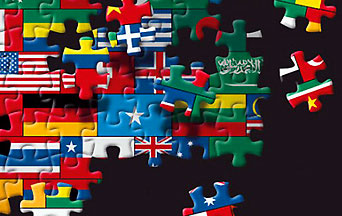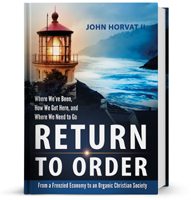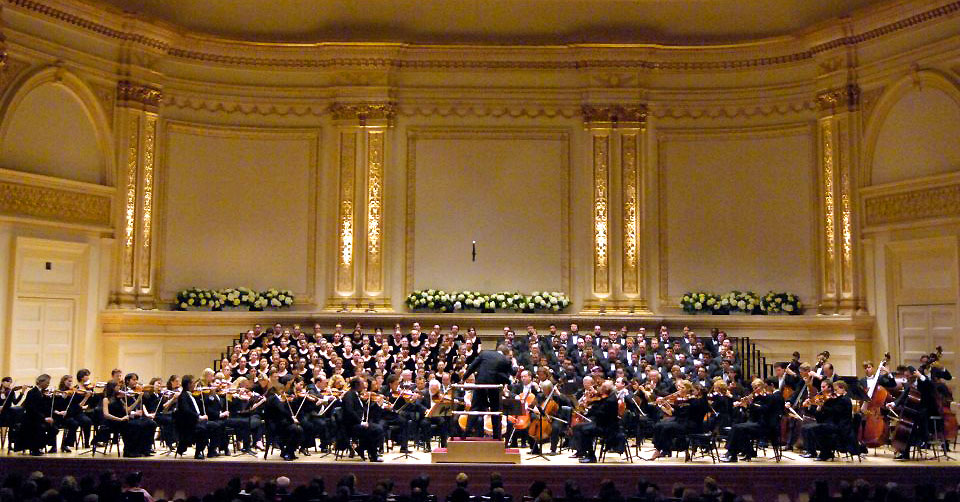
A review of the book, The Virtue of Nationalism, by Yoram Hazony.
It is not easy for a Catholic writer to evaluate a book by a Jewish author advocating a Protestant political framework. That is the task for the Catholic reading The Virtue of Nationalism by Yoram Hazony. The recent book is a challenging addition to the already complex debate over nationalism that now rages.
There is much to appreciate in Dr. Hazony’s observations of the present political order. One can agree with his analysis of the problems of globalism. His critical assessment of the liberal state and Enlightenment thought merits attention. He recognizes the importance of the family and intermediary groups in society. He does well to bring all these issues to the forefront.
However, the book is marked by a spectacular clash of ideas. The premises and classifications that the author uses to define his debate make it difficult for someone with a Catholic background to agree—even when trying. The involuntary clash is so violent that it proves impossible to overcome despite other points of agreement.
Three Political Frameworks
According to the author, there are only three political frameworks of order that exist in history—two extremes and one in the middle. The first extreme is a system of the clans and tribes that form an “anarchical” society without central government or state. The second extreme is the imperial system of government, which is “an order of peoples united under a single regime of law, promulgated and maintained by a single supranational authority.” The European Union and globalism are examples. And finally, there is an order of free and independent national states in which peoples govern themselves with “the greatest possibility of collective self-determination.” England and the Netherlands are curiously cited as examples, although he laments that both maintained vast colonial empires.
Inside these peculiar categories, the present fight can be simplified as an age-old struggle between the national state and empire. “Imperialism and nationalism are formidable and opposed ideas that have contended with one another in the past, and they have resumed their old conflict in our day.” Should this struggle not be resolved, one is left to conjecture about the danger of falling into the anarchy of tribal and identity politics.
This dialectic fits well into the present scenario of globalism, decaying liberalism and rising populism playing out in the headlines and Twitter feeds everywhere. Everything should point to the reasonable idea of the return of the national state.
The Church Adopts the Imperial Model
However, the spectacular clash is not long in coming. Early in the book, the author cites the “Catholic” position as problematic. The Catholic Church adopted the Roman imperial model in the spiritual realm. The Church, claiming universal jurisdiction, usually allied Herself with empire as seen with the German Holy Roman emperors or the universal concept of Christendom.
The author believes the Gallican error of the French Catholic Church was the more reasonable nationalist approach as were certain schismatic sects in Poland and other places. This movement away from empire later saw its fullest realization in the Protestant revolt that “became tied to the unique national traditions of peoples chaffing against the ideas and institutions that they regarded as foreign to them.” Thus it was that Henry VIII asserted the independence of the English nation and Church (and enriched himself in the process). The doctrine of self-interpretation of Scriptures had its political application of self-determination that shattered the unity that was Christendom.
The author focuses on this ideal “Protestant construction” of nationalism culminating with the Treaty of Westphalia in 1648. He rejects later evolutions that incorporated Enlightenment thought.
Making Distinctions
The Church’s social teaching can enrich the debate provoked by the author’s proposed dialectic. It can clear up confused notions of what constitutes society, nation, State, and government. Four distinctions need to be made.
As Dr. Hazony rightly states, society starts with informal groupings of individuals, families, clans, tribes and intermediary associations mostly dedicated to furthering their collective interests. However, these informal and imperfect social units cannot be compared with nations or the State. Except in primitive settings, tribes and clans cannot exist outside the greater political framework of some kind of state.
When a collection of social units coalesces into a distinctive whole, a nation is born. The nation forms a cultural, social, economic, and political unity unable to be included or federated into any other. However, even a nation does not form a political order.
Order Here: Return to Order: From A Frenzied Economy to An Organic Christian Society
An order appears when the State is born, and people must be governed. Catholic political philosophy holds that human nature is the origin of the State. As a social and political being, man needs a corresponding order to obtain these ends. The State is the political organization and order of the nation. It is the natural union of individuals, families and groups. The State exists to safeguard the common good and facilitate virtuous life in common. It presupposes a people, intermediary associations, territory, and organized political power. The State creates the government, which is the political system and institutions by which the State is administered and regulated.
The State manifests itself according to the marvelous variety found in peoples. The myriad ways of organizing a State make each one individual and different. A State can take the form of a single people inside a given territory. There are also federated states like those of Switzerland that find rich expression in variety. Weak and unprotected peoples might find protection in empires as with the Holy Roman Empire, a collection of hundreds of nations and sovereign states. Some States have such a unifying and robust character that they can form vast social units with many strong subsidiary components, fully integrated into the whole. Czar Nicholas II was, for example, called the czar of all the Russias.
Thus, as long as these institutions safeguard the common good, defend the rule of law, and follow natural law, they are good and beneficial. When any of them adopts tyranny, practices injustice and despises the moral law, it becomes harmful. A national state and empire need not clash.
Two Clashing Outlooks
But clash they do in Dr. Hazony’s narrative. Here enter the limitations of his definitions that cloud the debate. He insists that all “universalist” political structures that propose broad solutions are by their nature despotic.
Thus, he associates all empires with the modern supranational inventions, rationalist models and totalitarian ideologies that have truly wreaked havoc upon the world. These modern anti-Christian inventions deserve every censure.
However, institutions like the Catholic Church and constructs like Christendom have their role in unifying peoples, establishing high moral standards and harmonizing the pursuit of the common good. These influences deserve to be recognized as beneficial to the world.
Indeed, it is disconcerting to find the author saying that, like Islam, for much of its history Christianity was universalist and hate-provoking, resembling “Communism and Nazism, which likewise sought to establish the rule of a single empire on earth.”
Meanwhile, the author constantly makes his own universal affirmation that “the best form of political order is an order of free and independent national states,” seemingly unconcerned with the contradiction.
Searching for a Desired Unity
The aim of political action is ever-greater union so that the common good might be advanced. Before nationalism appeared on the scene in modern times, political thought was dominated by the pursuit of general and universal principles that resulted in the desired unity.
Universal ideas are needed since human nature is the same for everyone. A Catholic society recognizes certain universal social, political and religious truths that are valid for all times, peoples and places. These have political consequences that create unity—which Dr. Hazony mistakes for empire.
The universal notion of a music scale, for example, establishes the foundation for an infinite variety of musical pieces. Likewise, the radiant unity of Christian truth manifests itself in a marvelous variety and freedom of applying these truths in practice. Unity gives rise to variety. That is why Christianity produced an extraordinary cultural richness inside a healthy and vibrant regionalism.
Focusing on Particulars
Nationalism holds a contrary view that focuses on particular and parochial interests that allows each people to pursue what it considers to be the truth “according to its own understanding” and a “diversity of constitutional and religious standpoints.” Dr. Hazony cites English jurist John Selden (1584-1654) who claimed that “human reason is capable of arriving at virtually any conclusion, and has never in history been able to arrive at a single political truth that all can agree upon.”
Thus, the object of this nationalist perspective is not unity but the shattering of truth. Each national State adopts after “a different set of aims, and is organized in a manner that is different from others.” In the absence of known truth, the future must be hashed out by a painful process of trial and error. The only certainty is the idealized State delineated by nationality.
This Protestant outlook holds that since there can be no discernment of universal political truths, each nation is free to adopt a hodgepodge of errors. Indeed, the author holds that from the chaos of experimenting to find solutions, order will somehow emerge. Extending the musical metaphor, in a world where all discern their own musical scales, the final result will not be a symphony, but cacophony.

Photo Credit: YorkshireRailman CC BY-SA 3.0 Unported
A Naturalistic Outlook
Finally, the nationalistic outlook also suffers the limitations of all naturalistic social theories that exclude God, His moral law, or man’s fallen nature. The author admits the need for a Biblical minimal moral order as a technical means to maintain order. However, there is no moral imperative that comes from human nature.
Instead, everything is defined in terms of “bonds of mutual loyalty” that take on an almost mystical character as the social glue that keeps society together. Today, these bonds of loyalty hardly exist since individualism has replaced them with shackles of personal gratification.
Without a teleological notion of man, this naturalistic perspective maintains a disbelief that men might live in society for the common good or sacrifice for the love of God. There is a need to reduce everything to a struggle for power, loyalty and self-interest. Thus, the nationalist must set up competing and offsetting systems to maintain the balance of natural urges.
Eternal and Natural Law: The Foundation of Morals and Law
All this is so different from the rich treasures of Catholic social teaching. The Church is not afraid to plumb the depths of the human soul or explore the supernatural heights of Providence’s plans regarding man. Inside Her Magisterium, one finds a unity of purpose and doctrine that spans the ages. Saint Thomas Aquinas’ soaring perspectives elevate Aristotle’s understanding of the natural order. The social encyclicals of Leo XIII demonstrated a profound and universal understanding of social order that challenged the industrialized world. With the crisis inside the Church in modern times, lamentably fewer solid documents appear, but a consistent defense of life and marriage does shine forth.
Hence, there is a spectacular clash between this vision of nationalism and Catholic social teaching. There is nothing new in this. The Church has always existed inside an atmosphere of spectacular clashes with the world around her.
